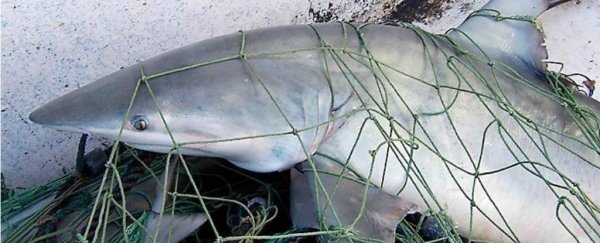Conservation group WWF Australia has purchased a commercial shark fishing licence on the Great Barrier Reef, with the sole aim of removing it from circulation.
The Great Barrier Reef has been in the news a lot lately, with 93 percent of the reef bleached earlier this year, hordes of Crown of Thorns starfish still causing damage, and plans to dredge the sea floor in a number of areas. But at least fishing is banned in the area… unless you spend enough money on a special licence, that is.
The AU$100,000 licence that WWF Australia has purchased, would have given its owner the right to drag a 1.2 km net (which is included in the purchase of the license) anywhere along the Great Barrier Reef, to target sharks, or other species.
"We're going to take it out of the water and make sure it doesn't go fishing," Conservation director Gilly Llewellyn told the ABC.
"We have a chance to … help save some of those sharks… This will also prevent dugongs, turtles and dolphins being killed as by-catch, and help the reef heal after the worst coral bleaching in its history."
The purchase comes after commercial shark catching almost doubled over the past few years, going from 222 tonnes caught in 2014 to 402 tonnes in 2015, according to the WWF. Llewellyn equates that to 100,000 sharks being caught just last year.
The WWF believes it's even more important to protect the species after this year's mass coral bleaching event, with a 2013 study showing that removing sharks from the ecosystem can make it harder for reefs to recover after bleaching.
"After bleaching, algae spreads," Llewellyn told Michael Slezak at The Guardian. "Researchers found that where sharks were removed by overfishing, smaller predators like snapper became more abundant. These snapper kill the algae-eating fish and the algae then overwhelms young coral."
WWF Australia hopes that donations will help pay for the fishing licence, and believes it was a worthwhile purchase. "Someone could buy it tomorrow and go fishing with it in a couple of months' time and it could be catching sharks again," Llewellyn said.
But not everyone is happy with this decision, with Stephanie Smail at the ABC reporting that many people believe the move was nothing more than a publicity stunt, seeing as the licence in question is hardly ever used anyway:
"The WWF's fishing licence has not been used since 2004, prompting questions about whether the move will make a difference… Mario Fazio, who is a net fisher in the region, argued sharks were not under threat. Especially considering the number of green and yellow protection zones across the reef, he said. 'It [the licence] is just a PR stunt and part of the political cycle,' Mr Fazio said."
Either way, the fact that the licence exists highlights the fact that the Great Barrier Reef is not as protected as we might hope.
Pressure to limit shark fishing in the area will hopefully help the Great Barrier Reef stay around for generations to come.
